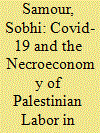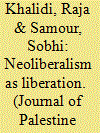| Srl | Item |
| 1 |
ID:
174255


|
|
|
|
|
| Summary/Abstract |
The situation of West Bank Palestinians working in Israel has highlighted a number of parallels with the conditions of global labor employed in essential sectors during the Covid-19 pandemic. Under capitalism, the compulsion to work, ostensibly to cultivate life, comes at the risk of being exposed to death, but is preferred over immiseration caused by unemployment. The pandemic has merely amplified existing structural features of such employment. For Palestinian workers, with the risk of infection in Israel being significantly higher, the perilous conditions experienced by Palestinian labor have turned the preservation of life enabled by such employment more firmly into the production of death. The Palestinian Authority (PA), too, faces a conundrum: to balance the economic benefits it derives from Palestinian disposability in the Israeli labor market with public health considerations limiting such employment. This essay argues that the Covid-19 pandemic lays fully bare the necroeconomy produced by the intersection of settler colonialism and capitalism, which also forms the bedrock of the necropolitical order in the West Bank.
|
|
|
|
|
|
|
|
|
|
|
|
|
|
|
|
| 2 |
ID:
102848


|
|
|
|
|
| Publication |
2011.
|
| Summary/Abstract |
The Palestinian statehood-by-2011 program, framed through neoliberal institution building, redefines and diverts the Palestinian liberation struggle. Focusing on its economic aspects, and in particular the underlying neoliberal thought that goes beyond narrow economic policy applications, this essay argues that the program cannot succeed either as the midwife of independence or as a strategy for Palestinian economic development. Its weaknesses, the authors contend, derive not only from neoliberalism's inability to deliver sustainable and equitable economic growth worldwide, but also because neoliberal "governance" under occupation, however "good," cannot substitute for the broader struggle for national rights nor ensure the Palestinian right to development.
|
|
|
|
|
|
|
|
|
|
|
|
|
|
|
|